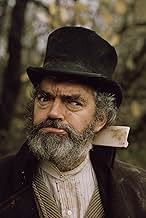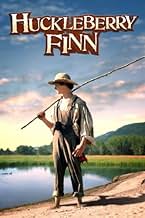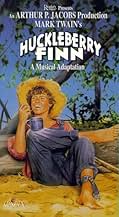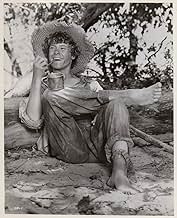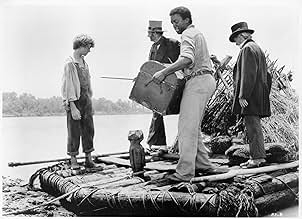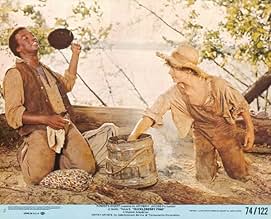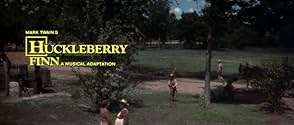In 1840s Missouri, young Huckleberry Finn, wanting to escape his violent drunkard father, joins Black runaway slave Jim on a quest for freedom down the Mississippi River on a raft.In 1840s Missouri, young Huckleberry Finn, wanting to escape his violent drunkard father, joins Black runaway slave Jim on a quest for freedom down the Mississippi River on a raft.In 1840s Missouri, young Huckleberry Finn, wanting to escape his violent drunkard father, joins Black runaway slave Jim on a quest for freedom down the Mississippi River on a raft.
- Director
- Writers
- Stars
- Director
- Writers
- All cast & crew
- Production, box office & more at IMDbPro
Featured reviews
This adaptation of the famous tale by Mark Twain starts with a song performed by Roberta Flack. My recommendation is to listen to the song, then not bother watching the rest of the film.
It does not take long to realize that the familiar story has been changed odiously and unforgivingly to fit another vision that is nowhere near as quaint and clever as Twain's. The writers have hijacked the famous title, changed the story, sanitized it in a way that recalls the censorship cases of the past, removed the authentic dialect, extracted the charm, and added music. We might ask why.
Apparently, to serve their own agenda. Then why not create this other story under another title, rather than usurping Twain's reputation? The result they have achieved with this modified piece is as inauthentic as a Bach fugue with its notes changed. Those who celebrate Twain's writing skills, his peerless wit, and his hard work preserving the native dialects of his time and location will find this to be a shallow (and dishonest) tweaking of Twain's timeless classic.
It does not take long to realize that the familiar story has been changed odiously and unforgivingly to fit another vision that is nowhere near as quaint and clever as Twain's. The writers have hijacked the famous title, changed the story, sanitized it in a way that recalls the censorship cases of the past, removed the authentic dialect, extracted the charm, and added music. We might ask why.
Apparently, to serve their own agenda. Then why not create this other story under another title, rather than usurping Twain's reputation? The result they have achieved with this modified piece is as inauthentic as a Bach fugue with its notes changed. Those who celebrate Twain's writing skills, his peerless wit, and his hard work preserving the native dialects of his time and location will find this to be a shallow (and dishonest) tweaking of Twain's timeless classic.
A forgotten relic from the early '70s, when shows like "Little House on the Prairie" and "The Waltons" all reflected our yearning for a so-called simpler, less complicated era. This adaptation, while not entirely faithful to the book, captures its essential themes and spirit rather well. There are some technical problems (the lighting always seem to be half in shadow, whether it's night or day!) and its kiddie-friendly tone seems at odds during the Grangerfords/Shepherdsons sequence, wherein we see men being shot and killed right on camera--and it's handled rather lightly. Parents should also be warned that this adaptation does have some strong language--it has not been sanitized, notwithstanding its G rating.
In addition, the musical format sits much more uneasily with this movie than with the superior "Tom Sawyer" (from the year before, with many of the same cast members and production staff). However, as oddly as some numbers come off, others are wonderful, such as the clever, dixie-ish "Cairo, Illinois," a duet between Huck and Jim that kicks off their great journey together. The jaunty title song and the lovely anthem "Freedom" also showcase the movie and its themes beautifully--especially during "Freedom"'s reprise, as Huck, the boy/man run away, gazes after Jim making his way downriver. Performances are generally strong--Jeff East could've been a better singer but his performance is so sincere and authentic, you hardly notice. Likewise his bond with Jim (well-portrayed by the late Paul Winfield) comes through nicely, most especially in their final, very moving scene together. Harvey Korman and David Wayne also deliver terrific turns as the King and the Duke, respectively.
Cinematography is *gorgeous*--the DP took full advantage of the location shoot, with some beautiful silhouette shots. Although its prequel is far better (you simply cannot top "Tom Sawyer"'s terrific score and thoroughbred cast), Mark Twain's quintessential Great American novel is reasonably well-served here, if not transcendently.
In addition, the musical format sits much more uneasily with this movie than with the superior "Tom Sawyer" (from the year before, with many of the same cast members and production staff). However, as oddly as some numbers come off, others are wonderful, such as the clever, dixie-ish "Cairo, Illinois," a duet between Huck and Jim that kicks off their great journey together. The jaunty title song and the lovely anthem "Freedom" also showcase the movie and its themes beautifully--especially during "Freedom"'s reprise, as Huck, the boy/man run away, gazes after Jim making his way downriver. Performances are generally strong--Jeff East could've been a better singer but his performance is so sincere and authentic, you hardly notice. Likewise his bond with Jim (well-portrayed by the late Paul Winfield) comes through nicely, most especially in their final, very moving scene together. Harvey Korman and David Wayne also deliver terrific turns as the King and the Duke, respectively.
Cinematography is *gorgeous*--the DP took full advantage of the location shoot, with some beautiful silhouette shots. Although its prequel is far better (you simply cannot top "Tom Sawyer"'s terrific score and thoroughbred cast), Mark Twain's quintessential Great American novel is reasonably well-served here, if not transcendently.
The Adventures of Huckleberry Finn is not a literary classic, a little slow and episodic, and Tom Sawyer and Prince and the Pauper are superior when it comes to Mark Twain. It is still a good read though and if you like Mark Twain there is little reason why you shouldn't like Huckleberry Finn. This musical version is watchable enough on its own terms but could have been better, the musical version of Tom Sawyer from a similar time frame was a better film from personal perspective. The Sherman Brothers' songs apart from Freedom and Cairo Illinois are disappointingly forgettable and some of them are either not very well placed(Royalty, though the number has some amusing moments) or pretty lifeless, most of their songs generally are timeless but Huckleberry Finn is one of their weakest overall scores. The story does lack sparkle sometimes and pacing-wise there are some dull stretches. There is some evidence of Twain's writing coming through, but with the political correctness treatment of Jim things can feel diluted, and some of the dark tone and strong language can have a tendency to be at odds with the rest of the film. Huckleberry Finn has great costumes and sets and is very handsomely filmed, especially in the ending and with the raft. There is some very funny comedy and heartfelt drama too, and the ending is very moving. J Lee Thompson directs and stages things very competently and with precision if on occasions a little too carefully. The performances are good, though the singing is not the best there is. Jeff East's Huckleberry is both spirited and sincere and even with the political correctness diluting Jim's character Paul Winfield is still very touchingly dignified. The chemistry between the two looks and feel really genuine. Harvey Korman and David Wayne were clever casting, and both are a lot of fun and they seem to be having a ball. All in all, disappointing but still watchable. 6/10 Bethany Cox
Talented filmmaker J. Lee Thompson stages this musical version of Mark Twain's "The Adventures of Huckleberry Finn" with artificial verve, and nothing in it looks quite right or plays at the appropriate tempo. Stolen from his guardians by his delinquent father, Huckleberry Finn stages his own death and hits the Mississippi River with friend Jim the Slave (why the two don't return to the sisters whom Jim works for is never made clear--both he and Huckleberry would certainly benefit from their generosity). Songwriters Richard and Robert Sherman, who also adapted the screenplay, seemed to lose their way musically once their mentor, Walt Disney, died; here, their songs are like leaden chapter stops in the narrative, not that the actors have much musical range. Teen star Jeff East doesn't even have music in his speaking voice, and he crawls through the picture lethargically, talking through his nose as if he had a cold. Paul Winfield fares better as Jim, though this pictorial, phony journey must have seemed quite a comedown after his "Sounder". Cinematographer László Kovács gets some beautiful shots of the raft on the water, but the limp direction and editing makes nearly all of Kovács' compositions look poorly framed. The color schemes are gloppy, with day scenes appearing as dusk and vice-versa. Director Thompson, who makes the white folks look like doddering scoundrels and the black folks look like grinning simpletons, can't work up a cohesive pace for the picture, and it jostles about from one poor vignette to the next. This was a follow-up by financiers Reader's Digest to 1973's "Tom Sawyer"; as with that film, a TV-version was right on their heels, in this case 1975's "Huckleberry Finn" starring Ron Howard and Donny Most. * from ****
Mark Twain purists might take issue with the changes made in the story of the
classic Huckleberry Finn. But I rather like the approach that was taken here and also the performance of Jeff East in the title role.
This was East's second film, he debuted the previous year in Tom Sawyer also playing Huck Finn. Later on he would be young Clark Kent in the blockbuster Superman film.
Harvey Korman and David Wayne are nothing short of brilliant as those two rogues the 'king' and the 'duke'. Both look like they are having a great old time. Gary Merrill is superb as Huck Finn's white trash Pap.
In this post civil rights era film particular emphasis is placed on Huck's relationship with runaway slave Jim with whom he shares that raft on the Mississppi. The optimism of Twain's work stems from the white trash background that Huck has, but that how he thinks and reasons and generally tries to rise above it. Some very good scenes are shared with East and with Paul Winfield as Jim.
The Sherman Brothers musical score is serviceable for the film, but nothing outstanding. The sets and cinematography really do convey life in the ante bellum souh and border states.
You can't go wrong with this adaption of Huckleberry Finn.
This was East's second film, he debuted the previous year in Tom Sawyer also playing Huck Finn. Later on he would be young Clark Kent in the blockbuster Superman film.
Harvey Korman and David Wayne are nothing short of brilliant as those two rogues the 'king' and the 'duke'. Both look like they are having a great old time. Gary Merrill is superb as Huck Finn's white trash Pap.
In this post civil rights era film particular emphasis is placed on Huck's relationship with runaway slave Jim with whom he shares that raft on the Mississppi. The optimism of Twain's work stems from the white trash background that Huck has, but that how he thinks and reasons and generally tries to rise above it. Some very good scenes are shared with East and with Paul Winfield as Jim.
The Sherman Brothers musical score is serviceable for the film, but nothing outstanding. The sets and cinematography really do convey life in the ante bellum souh and border states.
You can't go wrong with this adaption of Huckleberry Finn.
Did you know
- TriviaThis was the first musicalization of Huckleberry Finn. The next one happened 10 years later in 1985, on Broadway; it was "Big River." a hit show which ran for several years and won seven Tonys, including Best Musical.
- Quotes
Huckleberry Finn: I don't give a damn what the whole world says, 'cause if I'm doin' wrong--well--well, I hope I roast in hell forever.
- ConnectionsFollows Tom Sawyer (1973)
- How long is Huckleberry Finn?Powered by Alexa
Details
- Release date
- Country of origin
- Official site
- Language
- Also known as
- Mark Twain's Huckleberry Finn: A Musical Adaptation
- Filming locations
- Production companies
- See more company credits at IMDbPro
Box office
- Budget
- $3,000,000 (estimated)
- Runtime
- 1h 58m(118 min)
- Color
- Aspect ratio
- 2.35 : 1
Contribute to this page
Suggest an edit or add missing content

